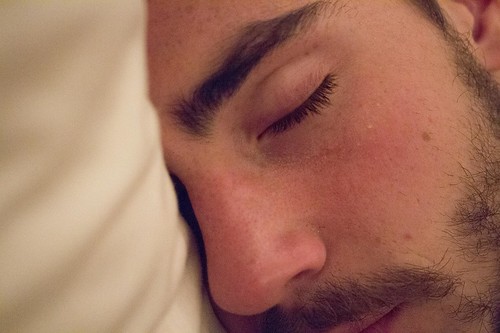
NSFW Samuel L. Jackson Reads Go The F to Sleep
https://www.youtube.com/watch?v=nDGKK6y8OtQ
Ok, that's great for kids, but how do I as an adult get to sleep. It's actually worse for adults because we don't have someone enforcing good sleep habits, and we have the freedom to make bad choices.
Good quality sleep is where our brain recovers from all the work it did during the day. There is a saying in bodybuilding that you don't grow in the gym, you grow during recovery. The same is true for your brain, it's not the learning and working that makes the brain improve, it's the good quality sleep and recovery that gets the brain gainz. Think about a time where you started working on a new skill and just couldn't quite get it, then after a good night sleep that same skill was all but automatic. That is your brain getting better during recovery.
I've assembled a list of tips in no particular order. These tips are not my own, I've borrowed them from many other sources, but they do work. For other resources feel free to search sleep hygiene.
1. Go to bed at the same time EVERY night. Yep, even weekends. It's not fun it's not glamorous, but like I said you are an adult, so you get to do boring grown up stuff like go to work, pay taxes and go to bed early.
2. Make you bedroom a place where only two things happen sleepy time and that other thing that consenting adults do. For now let's just focus on sleep. What this means is you don't do things in this room that aren't sleep. No television, no laptop, no smartphone, and even no reading.
3. Get your bedroom as dark as possible. Go the full nine yards here. Blackout curtains, cover up the screen of your alarm clock, if you must have your phone by you, put it in a drawer. You should literally (the real literally) not be able to see your hand in front of you face. If there are too many complicating factors, such as uncooperative spouse, get a sleep mask which is not at good as pitch black, but better than nothing.
4. No stimulants nor alcohol near bedtime. No caffeine, nicotine or alcohol around bed time. Stimulants of course make sense, but alcohol while it might help you fall asleep, will give you a worse night sleep. Feel free to look that up.
5. Control your lighting throughout the day. In general what this means is that you want a lot of blue light in the morning preferably by getting real sunlight and as little blue light in the evenings as possible. For the morning you can also get a full spectrum light or a blue light that are treatments for seasonal affective disorder but also work to just get better sleep. At night, you should get a blue light filter for your screens such as f.lux for your computer and there are similar apps for mobile devices. Alternately you can wear orange or yellow glasses that block the blue light. For more information on blue light and sleep check this out https://www.scientificamerican.com/article/q-a-why-is-blue-light-before-bedtime-bad-for-sleep/
6. Set up a winding down routine. You may need to find out what works for you, if it's reading fiction, listening to a book, watching a relaxing show (with your blue light filtering in action). You'll need to find out what works for you, but there are certainly bad choices, such as vigorous exercise (especially if competitive), arguments, overstimulating entertainment. Anything that's going to give you a shot of adrenaline is a bad idea.
BONUS SECTION:
7. Take a magnesium supplement. Magnesium is a mineral that most Americans are deficient in so in addition to getting better sleep you'll be helping out your bones. Two warnings, first work your way up on doses magnesium in large doses can have a laxative effect, so just add a little bit at a time to find out where your sweet spot is. Secondly and less problematic, magnesium supplementation can give you very vivid dreams for the first couple of weeks you use it. Just be prepared for it and enjoy it. I'm not sure the mechanism for this, but there is a lot of anecdotal evidence on it.
8. Keep your bedroom cool. 60 - 67 degrees Fahrenheit is the optimum for best sleep. Just think of those evenings in early fall when you keep the windows open and sleep like a baby. That's the kind of temperature we're shooting for.
9. Get exercise, but not close to bed time. Getting some daily exercise aids in getting better sleep.
10. Watch what you eat before bed. This is not about physique goals, but rather about sleep quality. If you eat foods that cause indigestion before bed, you might be signing up for a rough night. This will vary a lot from person to person, but things to watch out for are spicy food and dairy.
Try some of these out, and please Go the F to sleep.
No comments:
Post a Comment